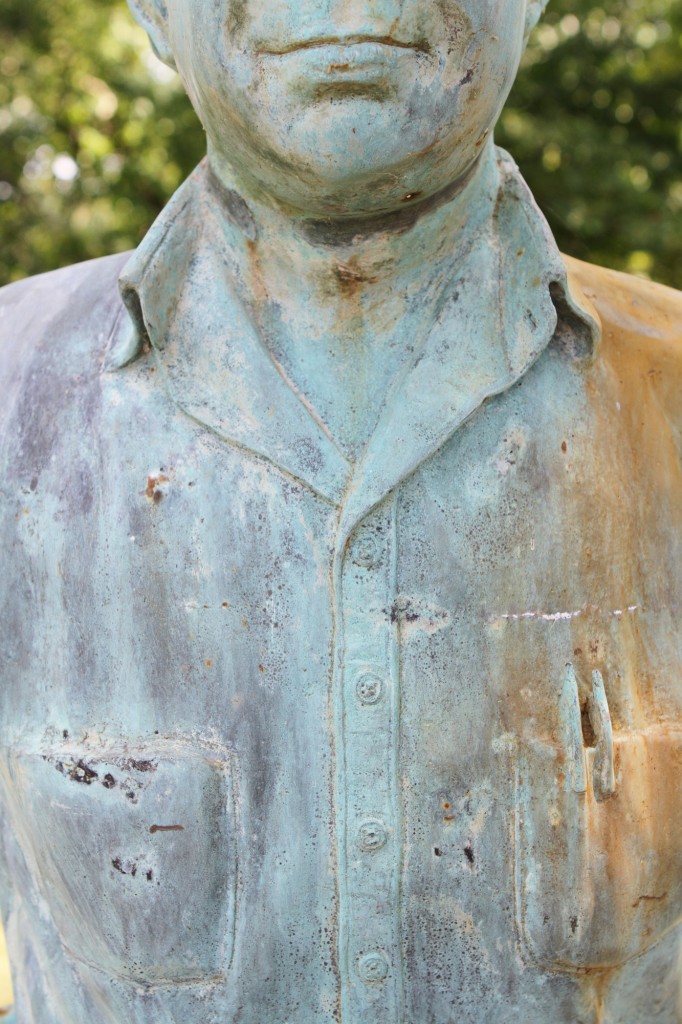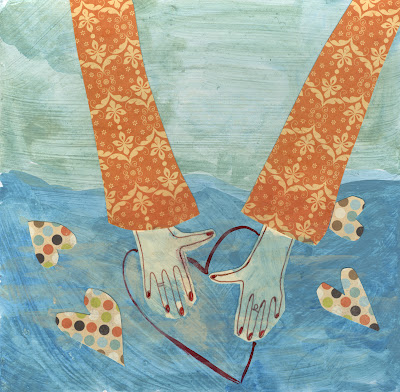
By Elizabeth Titus
Hours after I became a mother at the age of forty-three in a remote city in China, I got a phone call from my brother Kent. Our father had suffered a cerebral aneurysm and was unlikely to live for more than a few days.
It was December 9, 1994. My father was seventy-six years old, living with his fifth wife in Florida. My mother—his first wife—had died eleven years earlier, and in those terrible ensuing years, my father went crazy and kept getting married to any woman who would say “yes.” He was depressed, desperate, defensive. No matter what his three children advised him, he always had a “next in line,” a woman he knew we’d all love.
The women were younger, destitute, uneducated, and amazed that a man had come along to rescue them. They had no idea that money was one thing, but what went with the money was a man who desired to control their every move. Always headstrong and impulsive, he became worse, so much so that my brothers and I wondered if he suffered from a borderline personality disorder. The judge in his second divorce hearing (the divorce after just a month from his marriage to Bert, a woman I never met who left her job as a waitress at his country club to marry him) suggested my father see a psychiatrist, which my father found absurd. He had no need for psychiatrists; in fact, he considered it a sign of weakness. It was whispered for years that his older sister, Anne, had seen a psychiatrist while she was at Wellesley College, because she was so “high-strung.”
The truth of the matter was that Anne had suffered at the hands of an alcoholic, abusive father who was an embarrassment to his family in the upstate New York town where they had lived. A graduate of Hamilton College in the same class as writer and critic and fellow curmudgeon Alexander Woollcott, of Algonquin Round Table fame, my grandfather was a brilliant, spoiled man who got a law degree at Columbia University and then never bothered to work.
“When was Grandpa’s last case?” I’d ask my father.
“Of Labatt?” was always the response.
We’d laugh and laugh at this private joke.
My grandfather would sit in an overstuffed, low-lying easy chair in the parlor of the Greek Revival home purchased for him and his bride Lucile by his father-in-law and smoke cigars and drink Labatt beer all day long, living off the income from a family bakery business that his wife’s ancestors started in 1896. When my grandfather fell out of bed, drunk, in his late seventies and broke his hip, the end was near. As he took his last breath, my father was at his side, and he told people later that he had said, “Good riddance, you son of a bitch.”
The night before my husband Gregory and I left for China in December 1994, I called my father in Florida to tell him we were on our way. I had seen him a few months earlier at the “celebration” of his fifth anniversary to his fifth wife. She had taken me aside and had said she was leaving him because he was crazy and a womanizer and told anyone who would listen about his new penile pump. I’d told Gregory to call Continental Airlines because we were returning to New York City immediately.
During my final conversation with my father that night before going to China, I tried, as I always had, to get him to focus on me, his youngest child and only daughter.
He talked about a cousin I barely knew and his wife’s friend who had gone to China to adopt a child. He relayed every detail of their trip.
“What about my trip?” I almost screamed into the phone. “What about me?”
I told Gregory that I hoped my father would drop dead.
And he did.
Did he die because I willed it? Did I kill my father?
“There’s nothing you can do,” my brother, a doctor in Richmond, Virginia, where my mother had grown up, told me. “You could never get back in time.”
I knew that I couldn’t leave China without first going through the legal adoption process, which would take place at the U.S. Embassy in Guangzhou in a few days. So I didn’t even think about leaving. A DES daughter, I had endured years of infertility, IVF, a stillbirth, and two ectopic pregnancies; nothing was going to stand in my way of becoming a mother now. I told Gregory that I didn’t want anyone in our group of twelve adoptive families to know about my father. I wanted to keep this separate from the joy of becoming a mother. I would file it away somewhere deep inside my brain and deal with it later.
And so we went on as we had before the phone call from my brother, delighting in our happy, beautiful baby girl. We have photos of the three of us, laughing and clapping our hands, in the hotel restaurant.
When my brother called two days later to say my father had died, never regaining consciousness, I cried, for the first time. And then we prepared for our long trip back to America with our baby girl, Wei Xin-Fei, renamed Lili.
I flew to Florida for the funeral, which took place on a golf course. Golf was his only real passion, so this was fitting. The master of ceremonies, if you will, was Patty Berg, the winner of a record fifteen women’s major golf championships and a founder of the Ladies Professional Golf Association. My father had become friends with the five-foot-two powerhouse Patty Berg because she was the pro at his golf club. After one of his divorces, he had nowhere to live, so he moved in with Patty. I had a hunch that she was a lesbian, although she never came out, which is the only explanation I had for why he didn’t marry her. I’m sure he asked, as he always did. But she was not his type; she was smart, successful, independent, tough. He liked the thirty-year-olds he met at shopping malls and bought televisions and VCRs for, the ones who had been mistreated by men. He was there to save them. His mission in life.
Patty Berg told funny stories about my father, like the time he got a hole in one and then tried to duck out of having to buy drinks for everyone. A notorious cheapskate, we had many family stories about how he’d put rotgut vodka in Smirnoff bottles. There was never a brand name in his cupboards; he was the king of store brands. Heinz Ketchup or Crest Toothpaste? Forget it.
He was the ultimate do-it-yourselfer, and not a very good one. He cut his own grass and hair, did the family laundry, whites and colors all together, and mended our clothes. My father prided himself on his sewing ability. When I’d visit him in Florida, I could see him eyeing my jacket to see if there were loose buttons.
“Take that jacket off, and I’ll sew that button back on right now,” he’d urge me. Or rather, order me.
“It’s okay, Dad,” I’d respond.
But he was a dog with a bone, and in no time, he’d whisk out his olive drab sewing kit, which he received during World War II, where he had served in North Africa soon after graduating from Yale. He had everything he needed in that frayed kit: small Wiss bandage scissors; a tape measure; some hooks and eyes; a thimble; sewing needles; a safety pin or two; and a couple spools of Coats & Clark’s Boilfast fifteen-cent thread. He had two colors of thread, forest green and blue-grey. Oblivious to matters of fashion, he paid no attention to matching his thread to the item in need of his attention.
When my father’s widow/almost ex-wife asked me to select a few items from his desk drawer in their condo in Florida, I came across the sewing kit.
FROM
AMERICAN RED CROSS
BEAVER CO. CHAPTER
NEW BRIGHTON, PENNA.
“I’d like to have this,” I told her.
“Oh, that Rex,” she laughed. “He did love to sew. And he was terrible at it.”
That Rex. Rexford Walker Titus Jr. My father. A lunatic, in so many ways. He drove me crazy, and then he died, before meeting his granddaughter. I rarely discuss him with her.
But now, days after she has turned twenty, I think I’ll show her the World War II sewing kit. And maybe I’ll tell her about Patty Berg and the funeral on a golf course and the grandfather she never knew.
I may also tell her a terrible truth of my own life: hours after she was brought to our hotel room, her father and I called his parents and my brother Kent to tell them we were parents. This was before Skype and Instagram, so there were no photos.
I planned to call my father in a day or two, but I didn’t, and it was too late. So he never knew of our joy. Why, oh why, was I so damn stubborn, such a child, at the age of forty-three? Why did I still feel the need to punish him, a confused, frightened man who lost his bearings when his wife died?
I return often to the final paragraph of a 1954 story by Harold Brodkey, called “State of Grace,” that I first read when I was an English teacher in Philadelphia in 1974. It left me speechless then, and it still does, forty years later. The author looks back at his arrogant, guarded thirteen-year-old self, filled with guilt and self-blame at his lack of tenderness toward a younger boy:
“I’m thinking of all the years that might have been—if I’d only known then what I know now. The waste, the God-awful waste. Really, that’s all there is to this story. The boy I was, the child Edward was. That, and the terrible desire to suddenly turn and run shouting back through the corridors of time, screaming at the boy I was, searching him out and pounding on his chest: Love him, you damn fool, love him.”
•••
ELIZABETH TITUS has been a journalist (Gannett), an English teacher, an advertising account executive (Doyle Dane Bernbach), and a communications director (fifteen years at American Express). She has a BA in English (Skidmore), an MA in English (University of Pennsylvania), and an MBA (Wharton). She left the corporate world in 2002 and has not looked back, dedicating her time to freelance writing, traveling to places she always longed to see (Africa, Russia, Turkey), taking courses at the Sarah Lawrence Writing Institute, and volunteering for two nonprofits devoted to educating Afghan women, the Afghan Women’s Writing Project (awwproject.org) and The School of Leadership Afghanistan (sola-afghanistan.org). She is the mother of Lili, age twenty, and the legal guardian of Sabira, an Afghan woman, currently at a boarding school in New England and hoping to attend Middlebury College in 2014.

 Follow
Follow
